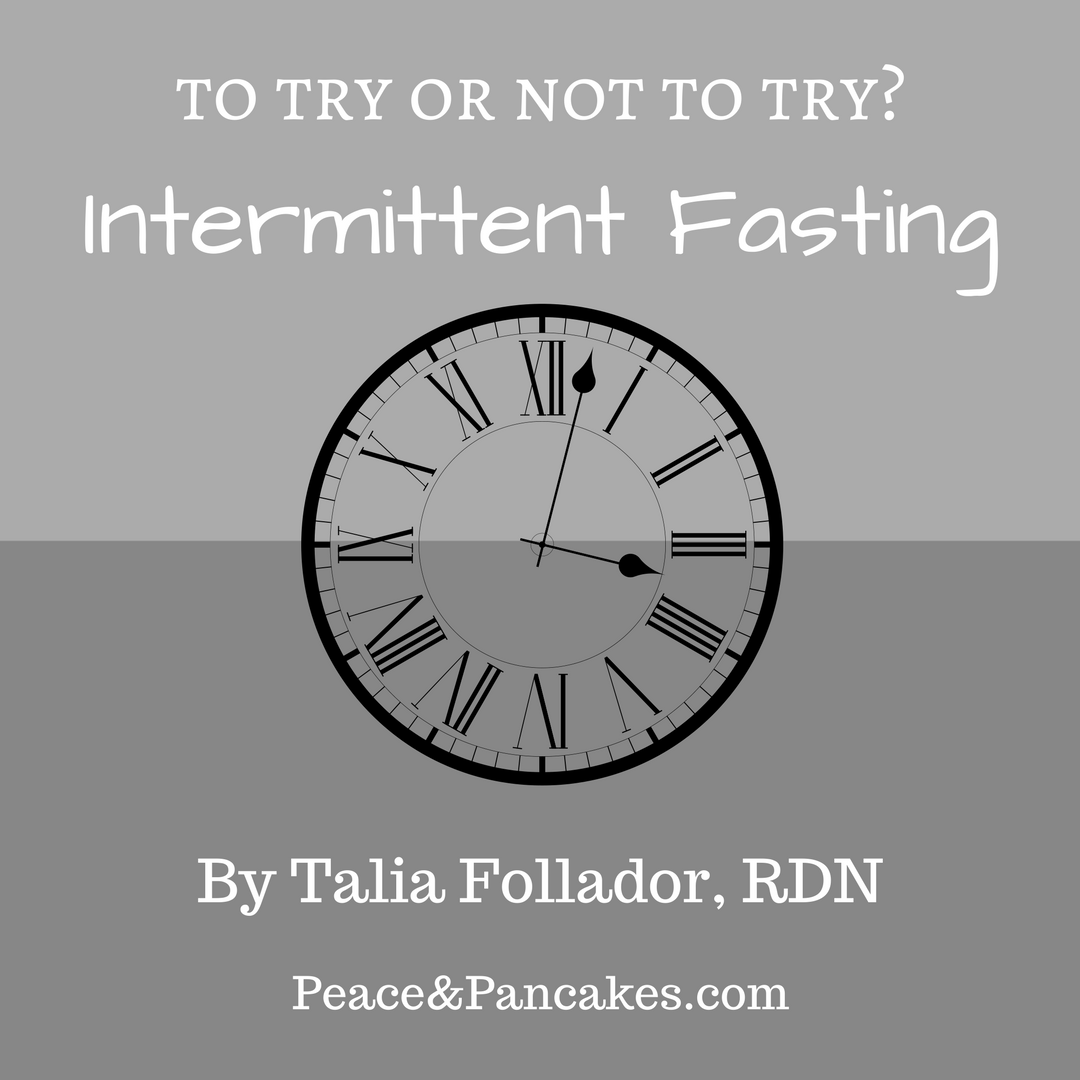This post is part of the “To Try or Not to Try” blog series. Written by a registered dietitian (RD) or dietetic intern, each post explores the claims and science surrounding a different dietary pattern or trend. After compiling this research, each RD or RD2be gave the diet a grade based on whether it appears to hold up to the hype. A = “yes, go for it!” and F = “no way, absolutely not!”
What is intermittent fasting recommended for?
Intermittent fasting is recommended on mainstream platforms for weight loss and muscle building. It is not widely recommended in the medical community, although some health professionals believe it may help to prolong life, promote weight loss, and prevent chronic disease.
What foods are allowed?
Intermittent fasting is unique in that it does not propose any specific macronutrient distribution or food exclusions; the only rule is how and when to fast. Some research proposes eating only during a certain number of hours each day. Other research proposes alternate day fasting in which you either completely or partially restrict energy intake 1-3 days per week. One example of this is the “5:2” rule: eat a normal amount of calories for five days a week and fast the other two days. Some studies define fasting days as consuming zero calories, while other studies restrict calories to 25% of estimated calorie needs on fasting days.
Are the claims supported by science?
Outcomes from animal studies on this dietary trend include decreased fasting glucose and insulin, decreased total cholesterol and triglycerides, and decreased cell proliferation (1-3). Intermittent fasting studies conducted on humans vary in sample size, duration, and methodology, so the findings cannot yet be generalized. Outcomes of these studies include:
- Decreased body weight, fat mass, and waist circumference without a decrease in fat-free mass (4-10)
- Weight loss maintenance (11, 12)
- Decreased insulin, blood glucose, and insulin resistance (13-14)
- Decreased triglycerides, total cholesterol, and increased HDL (13, 15-16)
- Increased adiponectin (13)
- Decreased leptin (13)
However, some studies have found that intermittent fasting and classic calorie restriction are equally effective for weight loss and improving hemoglobin A1C (17-21). Two studies found that post-meal glucose responses actually worsened for women after fasting (22-23).
There is little research on how intermittent fasting impacts the gut microbiota. One 2015 study showed that time-restricted feeding in mice changed bile acid signaling, which led to a more dynamic, less obesogenic gut microbiome (24). This finding has not been observed in humans.
No research in humans has shown any sign of micronutrient deficiencies due to intermittent fasting. As long as a person is eating a balanced diet, they would probably have adequate micronutrient status. For people who choose to do zero calorie fast days, particular attention must be made to consuming a balanced diet on non-fasting days.
Are there any possible hormonal disturbances?
As previously explained, some studies have shown intermittent fasting is associated with decreased insulin. Insulin is a hormone that promotes the entry of glucose into body cells and the storage of fatty acids as triglycerides. Thus, decreased insulin could help prevent both drastic disturbances in blood glucose levels and excessive body fat storage. However, this effect may not pan out the same for everyone, as women have been observed to have worsened blood glucose responses after intermittent fasting (22-23). Some studies have also observed an association between intermittent fasting, increased adiponectin, and decreased leptin. Adiponectin is a cytokine (aka cell-signaling protein) that is secreted by adipose tissue; blood levels are negatively associated with body weight. Leptin is also secreted by adipose tissue and decreases appetite. Once again, it’s important to note that these observations are not yet generalizable for all populations.
Who should definitely not try intermittent fasting?
- People with diabetes. Complete fasting or inadequate intake of carbohydrates could lead to hypoglycemia, especially if on insulin or blood glucose-lowering medications. This population should definitely consult with a doctor if considering intermittent fasting.
- People undergoing treatment for an eating disorder or with a history of an eating disorder. Any restriction could possibly trigger binge eating or a restrict-binge cycle.
- Patients with cancer. This population often has trouble obtaining adequate nutrition status due to poor appetite and side effects of treatment including nausea, vomiting, diarrhea, and taste alterations. Placing any further restrictions on food intake could derail recovery.
- People with dietary restrictions for a medical reason (Celiac disease, kidney disease, allergies, food-drug interaction, etc.). Proponents of intermittent fasting boast that you can “eat whatever you want,” as long as you follow the fasting rules. It may be common sense, but people with any food restrictions for a medical reason should definitely not follow the “eat whatever you want” mentality.
- Pregnant women, children, and adolescents. This population has higher energy and nutrient needs to support growth and thus should not be advised to fast.
What are the overall pros and cons of intermittent fasting?
Possible pros to intermittent fasting observed in research include an improvement in quality of life, decreased depression symptoms, and ease of adherence (25, 26). There also appear to be a plethora of positive outcomes from intermittent fasting; however, the research is limited. These findings may not pan out long term or may not be the same for different populations.
There are also possible downsides to intermittent fasting. Reported negative side effects from the research include feeling cold, irritability, low energy, hunger, dizziness, general weakness, and increased depression (6, 13). Additionally, implementing it could be difficult depending on a person’s lifestyle, such as someone who is extremely physically active or has a busy schedule. Intermittent fasting could also interfere with social life and relationships; a person could miss out on social gatherings or dates if these events don’t align with the fasting schedule. Diet quality may decline due to the “eat whatever you want” mentality. For some people, this diet could also trigger bingeing or other disordered eating behaviors or even lead to an eating disorder.
What grade do you give intermittent fasting?
I give intermittent fasting a C. The research so far has been promising, but more definitely needs to be conducted before making widespread recommendations. Eating zero calories (or even 25% of your calorie needs) for a day is difficult and unnecessary. Only eating during a certain number of hours per day seems reasonable but doesn’t need to be a strict rule.
What is your recommendation for an eating pattern for the average human?
My general recommendation for a healthy eating pattern is to eat a variety of fruits, vegetables, whole grains, legumes, nuts, seeds, and lean proteins; reduce intake of processed foods; don’t go too long without eating (3-5 hours); and drink water. Eat when you’re hungry, stop when you’re full, and know that it’s okay to eat for reasons other than hunger or to eat beyond fullness. Most importantly: enjoy your food, and don’t let it get in the way of your peace and happiness!
DISCLAIMER:
This content is intended for informational and educational purposes only. It is not intended as medical advice, medical nutrition therapy, or individualized nutrition counseling. Talk to your doctor or another licensed healthcare practitioner before making any changes to your diet, medications, or exercise routine. The opinions of these authors are their own and are not approved, sponsored, or endorsed by any professional organizations including but not limited to the Academy of Nutrition and Dietetics, United States Department of Agriculture, Food and Drug Administration, National Institutes of Health, American Heart Association, and American Diabetes Association.
Sources:
- Varady KA, Hellerstein MK. Alternate-day fasting and chronic disease prevention: a review of human and animal trials. Am J Clin Nutr. 2007;86(1):7-13.
- Longo VD, Mattson MP. Fasting: molecular mechanisms and clinical applications. Cell Metabol. 2014;19(2):181-192.
- Horne BD, Muhlestein JB, Anderson JL. Health effects of intermittent fasting: hormesis or harm? A systematic review. Am J Clin Nutr. 2015;102(2):464-470.
- Heilbronn LK, Smith SR, Martin CK, Anton SD, Ravussin E. Alternate-day fasting in nonobese subjects: effects on body weight, body composition, and energy metabolism. Am J Clin Nutr. 2005;81(1):69-73.
- Johnson JB, Summer W, Cutler RG, et al. Alternate day calorie restriction improves clinical findings and reduces markers of oxidative stress and inflammation in overweight adults with moderate asthma. Free Radic Biol Med. 2007;42:665-674.
- Hoddy KK, Kroeger CM, Trepanowski JF, Barnosky AR, Bhutani S, Varady KA. Safety of alternate day fasting and effect on disordered eating behaviors. Nutr J. 2015;14:44.
- Eshghinia S, Mohammadzadeh F. The effects of modified alternate-day fasting diet on weight loss and CAD risk factors in overweight and obese women. J Diabetes Metab Disord. 2013;12:4.
- Varady KA, Bhutani S, Klempel MC, et al. Alternate day fasting for weight loss in normal weight and overweight subjects: a randomized controlled trial. Nutr J. 2013;12(1):146.
- Klempel MC, Kroeger CM, Varady KA. Alternate day fasting with a high-fat diet produces similar weight loss and cardio-protection as ADF with a low-fat diet. Metabolism. 2013;62(1):137-143.
- Williams KV, Mullen ML, Kelley DE, Wing RR. The effect of short periods of caloric restriction on weight loss and glycemic control in type 2 diabetes. Diabetes Care. 1998;21:2-8.
- Keogh JB, Pedersen E, Petersen KS, Clifton PM. Effects of intermittent compared to continuous energy restriction on short-term weight loss and long-term weight loss maintenance. Clin Obes. 2014;4(3):150-156.
- Harvie M, Wright C, Pegington M, et al. The effect of intermittent energy and carbohydrate restriction v. daily energy restriction on weight loss and metabolic disease risk markers in overweight women. Br J Nutr. 2013;110(8):1534-1547.
- Patterson RE, Laughlin GA, LaCroix AZ, et al. Intermittent fasting and human metabolic health. J Acad Nutr Diet. 2015;115(8):1203-1212.
- Barnosky AR, Hoddy KK, Unterman TG, Varady KA. Intermittent fasting vs daily calorie restriction for type 2 diabetes prevention: a review of human findings. Transl Res. 2014;164(4):302-311.
- Heilbronn LK, Civitarese AE, Bogacka I, Smith SR, Hulver M, Ravussin E. Glucose tolerance and skeletal muscle gene expression in response to alternate day fasting. Obes Res. 2005;13:574-581.
- Horne BD, Muhlestein JB, Lappe DL, et al. Randomized cross-over trial of short- term water-only fasting: metabolic and cardiovascular consequences. Nutr Metab Cardiovasc Dis. 2013;23(11):1050-1057.
- Harvie MN, Pegington M, Mattson MP, et al. The effects of intermittent or continuous energy restriction on weight loss and metabolic disease risk markers: a randomized trial in young overweight women. Int J Obes (Lond). 2011;35:714-727.
- Davis CS, Clarke RE, Coulter SN, et al. Intermittent energy restriction and weight loss: a systematic review. Eur J Clin Nutr. 2016;70(3):292-299.
- Alhamdan BA, Garcia-Alvarez A, Alzahrnai AH, et al. Alternate-day versus daily energy restriction diets: which is more effective for weight loss? A systematic review and meta-analysis. Obes Sci Pract. 2016;2(3):293-302.
- Lettieri-Barbato D, Giovannetti E, Aquilano K. Effects of dietary restriction on adipose mass and biomarkers of healthy aging in human. Aging (Albany NY). 2016;8(12):3341-3355.
- Carter S, Clifton PM, Keogh JB. The effects of intermittent compared to continuous energy restriction on glycaemic control in type 2 diabetes; a pragmatic pilot trial. Diabetes Res Clin Pract. 2016;122:106-112.
- Antoni R, Johnston KL, Collins AL, Robertson MD. Investigation into the acute effects of total and partial energy restriction on postprandial metabolism among overweight/obese participants. Br J Nutr. 2016;115(6):951-959.
- Heilbronn LK, Civitarese AE, Bogacka I, Smith SR, Hulver M, Ravussin E. Glucose tolerance and skeletal muscle gene expression in response to alternate day fasting. Obes Res. 2005;13:574-581.
- Chaix A, Zarrinpar A. The effects of time-restricted feeding on lipid metabolism and adiposity. Adipocyte. 2015;4(4):319-324.
- Teng NI, Shahar S, Manaf ZA, Das SK, Taha CS, Ngah WZ. Efficacy of fasting calorie restriction on quality of life among aging men. Physiol Behav. 2011;104:1059- 64.
- Varady KA, Bhutani S, Church EC, Klempel MC. Short-term modified alternate-day fasting: a novel dietary strategy for weight loss and cardioprotection in obese adults. Am J Clin Nutr. 2009;90(5):1138-1143.

